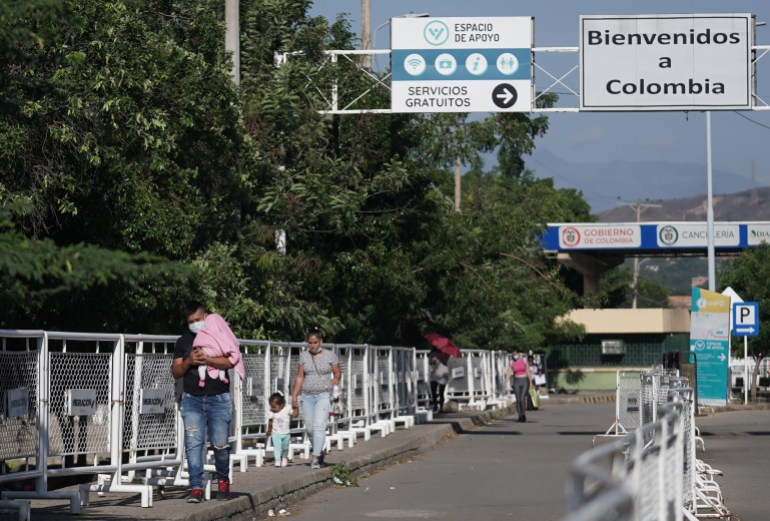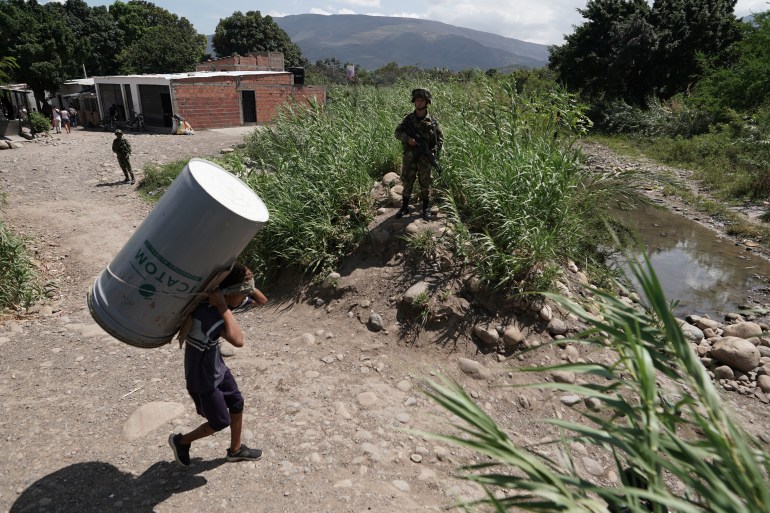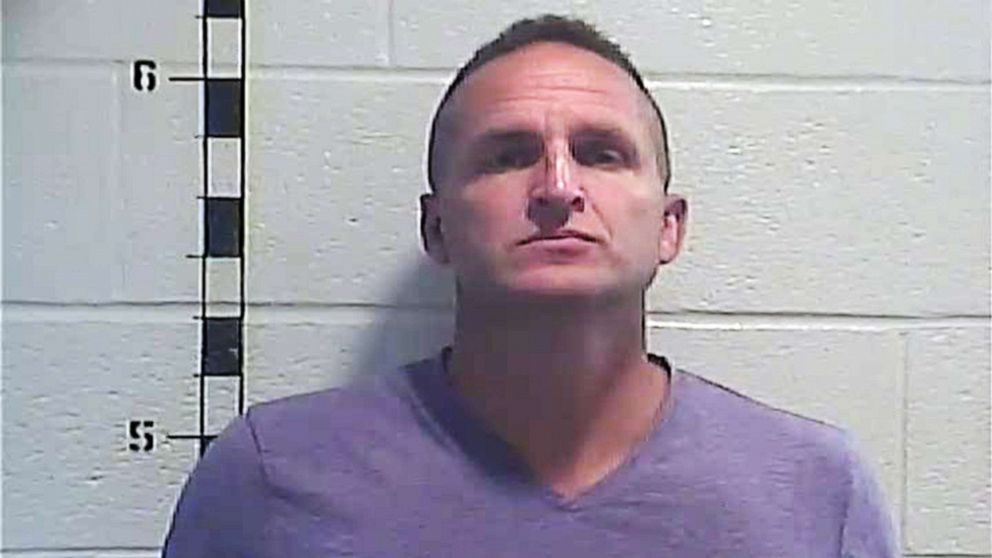Colombia troop deployment at Venezuela border raises questions | Border Disputes News
Bogota, Colombia – Colombia has sent 14,000 soldiers to its border with Venezuela, which is reopening this week after a three-year closure, in a move rights groups and political analysts say could fuel tensions between the countries.
The Venezuelan government began the process of reopening the border on Tuesday by removing containers placed at the Simon Bolivar International Bridge in 2019.
At the time, Venezuelan President Nicolas Maduro had ordered the closure when a United States-backed humanitarian convoy planned to cross the bridge to deliver aid amid huge shortages of basic food and medical supplies in the country.
However, the 2,200km (1,367-mile) border had already been closed to vehicles since 2015 due to a separate political dispute between the Andean nations, which have been at odds over a surge in Venezuelan migrants crossing into Colombia and the presence of armed groups along the border, among other issues.
The decision to reopen the border comes after years of pressure and negotiations by local residents in those areas, as well as civil society groups and workers’ unions, explained Ronald Rodriguez, head of the Observatory on Venezuela at Bogota’s Rosario University.
 People cross the Simon Bolivar International Bridge in Cucuta, Colombia, on October 7 [Nathalia Angarita/Reuters]
People cross the Simon Bolivar International Bridge in Cucuta, Colombia, on October 7 [Nathalia Angarita/Reuters]Rodriguez told Al Jazeera that while there has always been a large military presence in the border zone, the deployment of thousands of Colombian troops will fuel tensions – and could risk derailing the rapprochement.
“They must be very careful because these types of actions could damage the process,” he said, adding that the diplomatic relationship between the two countries is at its worst.
“We are used to a diplomatic relationship of shouting insults, threats and accusations back and forth, and in the end, the people who live in the border areas who are the most affected by all of this are tired,” Rodriguez said.
Informal crossings
Colombia has been struggling to cope with the influx of Venezuelan refugees and migrants fleeing poverty, violence, and a lack of basic necessities including medicine. More than 5.6 million Venezuelans have left the country in recent years, according to the United Nations, in “one of the largest external displacement crises in the world”.
Venezuela for a long time denied that a humanitarian crisis was unfolding, fuelling tensions with its neighbour. There also have been continual skirmishes on the border, mostly due to the activity of illegal armed groups on either side.
This week, however, Venezuelan Vice President Delcy Rodriguez expressed optimism at the border’s reopening, saying on Monday that the decision was made after “thinking of our people, of the brotherhood and cooperation between the people of Colombia and Venezuela”.
Colombia’s right-wing President Ivan Duque was more measured. “Colombia is willing to begin an orderly process so that we can guarantee this border crossing,” he said, cautioning that the process would not be “disorderly” or “sudden”.
Duque also said he spoke to Venezuelan opposition leader Juan Guaido about the reopening, which the Colombian leader said was pushed by Caracas “above all to allow access for goods and services” without using informal border crossings run by criminal groups.
These crossings, known as “trochas”, for years have been the only way Venezuelans and Colombians could cross the border. A huge percentage of the Venezuelans who have fled their country en masse since 2016 used “trochas” to cross the Simon Bolivar Bridge into the Colombian city of Cucuta. About 1.8 million Venezuelan migrants now reside in Colombia.
Criminal groups
Ariel Avila, a political analyst and deputy director of the Peace and Reconciliation Foundation (Pares), said the reopening will be a big relief for those who had to use the informal crossings. “A lot of the population had to pay criminal groups to be able to pass through,” Avila told Al Jazeera.
“But this [reopening] isn’t going to change at all the dynamics in the area,” he said. “It is a very militarised area. Sending 14,000 soldiers isn’t going to make a difference, because the control of these areas by criminal groups is very high and there is no cooperation between the two countries.”
Colombia’s only existing rebel group, the National Liberation Army (ELN), and dissidents from the Revolutionary Armed Forces of Colombia (FARC) operate on both sides of the border. A Colombia military chief last week said 1,900 fighters belonging to Colombian rebel and crime groups operate from Venezuela. Other paramilitary-style groups control some of the “trochas”.
Duque frequently blasts Maduro for liaising with rebel groups and has accused him of involvement in drug trafficking. Maduro said in February that Duque is turning his country into a “narco-state”, referring to the fact that Colombia continues to be the world’s top producer of cocaine.
The Reuters news agency reported this week that Duque said the military unit deployed to the border, known as CENOR, “will look to crush drug trafficking and terrorism, as well as toppling financing for organised crime”.
 Members of the Colombian military patrol while people walk between Colombia and Venezuela by an unofficial crossing, in Villa del Rosario, Colombia, on October 7 [Nathalia Angarita/Reuters]
Members of the Colombian military patrol while people walk between Colombia and Venezuela by an unofficial crossing, in Villa del Rosario, Colombia, on October 7 [Nathalia Angarita/Reuters]Jorge Mantilla, a Colombian researcher specialised in organised crime at the Colombian border, told Al Jazeera the security situation has deteriorated in recent months. There have been various attacks by rebel groups on police infrastructure and an increase in territorial wars between the several illegal armed groups and criminal gangs there, who mainly compete for drug trafficking routes.
“Despite [the border] being highly militarised, the armed groups are stronger and richer than they were at the beginning of President Duque’s government,” Mantilla said. “Unfortunately the state’s military efforts have not translated into greater security.”
‘Important humanitarian step’
A dramatic change in migration also is not expected, as the border reopening will be gradual and very controlled, said Elizabeth Dickinson, a senior Colombia analyst at the International Crisis Group (ICG).
“It is an important humanitarian step because there are humanitarian necessities,” she told Al Jazeera, explaining that pregnant women and Venezuelans seeking medicine and food have risked sexual violence and exploitation to cross the border informally.
“They’ll now have the opportunity to go through a formal crossing route,” Dickinson said.
Gimena Sanchez, at the Washington Office on Latin America, agreed that the reopening is a positive step, but said she was concerned Colombia’s military deployment would further strain already tense relations with Venezuela.
“I don’t think throwing the military at the different issues affecting [Colombia] solves the problem,” Sanchez told Al Jazeera. “There needs to be an integral approach that takes into account human rights and also listens to the people affected by whatever reason the military is being sent in.”
For Dickinson, one of the biggest questions is not how many soldiers have been sent, but what exactly their purpose is.
“One of the challenges we’ve seen in this region previously is that although there is a large number of troops around the border … they haven’t actually been able to conduct the level of operations you would expect given their manpower,” she said.
“I think the key question here is not really how many troops are there, but what role will they be playing and how much oversight will they be able to provide over the illicit economy and armed group activity in the region?”

